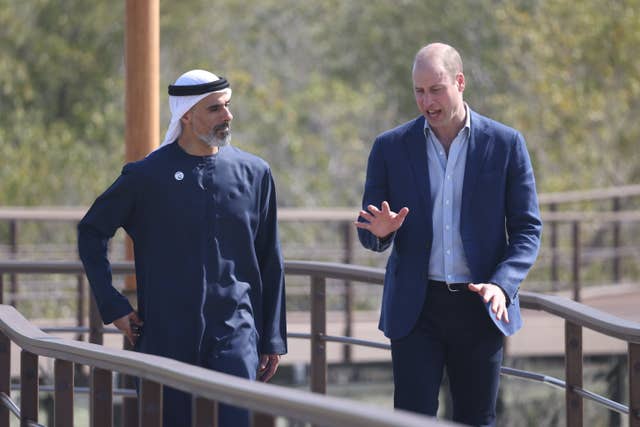The Duke of Cambridge has planted mangrove saplings in the United Arab Emirates (UAE) with a group of children, and told them “you are the future” in the fight to save the planet.
The future king, dressed in a suit, crouched down to give the young plants a start in life when he visited a nature reserve in Abu Dhabi.
In a drive to help protect regional flora and fauna, environmental campaigner William went to learn about efforts to safeguard the wetlands with the son of Abu Dhabi’s Crown Prince, Sheikh Khaled.
William and Sheikh Khaled planted mangrove saplings together at the Jubail Mangrove Park and were told mangroves capture four times more carbon than rain forests.
The duke chatted to Amaan Haider, 13, and Lily-Rose Mayall, 12, from the British School Al Khubairat in Abu Dhabi.
He told the students: “You are the future. Keep up the good work.”

Mark Leppard, the school’s headmaster, said: “The children who were introduced to the prince are part of our global leaders programme, who all volunteer, and follow the 20 global goals for sustainability.
“This initiative is part of improving the local environment. They’ve been excited and surprised and this came through (with them being) ecstatic about sharing their thoughts.”
William’s visit marked the launch of the Abu Dhabi Mangrove Initiative, between the Zoological Society of London and the Environment Agency – Abu Dhabi, to create a mangrove nursery as a centre of research, learning and outreach.
During the visit, the duke and Sheikh Khaled, who is chairman of Abu Dhabi Executive Office, discussed their work on promoting sustainability.
William has attempted to tackle the illegal trade in items like ivory and rhino horn through his umbrella body United for Wildlife (UFW) and staged the inaugural awards ceremony for his environmental Earthshot Prize last autumn.

For more than five years, UFW’s Transport Taskforce has been working to foster collaborations between the transport sector and law enforcement to prevent wildlife trafficking, and UFW has also been working in the UAE to achieve this aim.
Later, the duke toured Dubai’s Jebel Ali Port, which is operated by DP World, a UFW taskforce member, and watched a demonstration of cargo being unloaded from container ships by crane, scanned for suspicious items and inspected by customs.
In a room where the results from X-rays of shipping containers are displayed on screens, William was told about new technology including equipment which helps pick up discrepancies such as a container weighing more then its cargo suggests it should.
The duke described the various developments as “very exciting” as he moved closer to the screens.
Outside, the officials inspected a suspect container and opened a trap door leading to a hidden floor with a stash of ivory underneath.
This morning we joined the team at @DP_World, who are working alongside @united4wildlife to fight against the illegal wildlife trade.
Initiatives like ‘Cargoes’, an AI technology to identify suspicious shipments, are even more vital with trade increasing & resource constraints. pic.twitter.com/zMiMdbJYDz
— The Duke and Duchess of Cambridge (@KensingtonRoyal) February 10, 2022
Wearing a hi-vis jacket and a hard hat, William watched as officials pulled out a large elephant tusk that had been seized in an earlier operation.
Ayla Bajwa, group head of sustainability at DP World, said afterwards: “His Royal Highness was saying that essentially we were on the same page, that there is an opportunity to leverage technology.”
She added: “He said that he is blown away by the technologies out there that can help combat illegal wildlife trade.”





Comments: Our rules
We want our comments to be a lively and valuable part of our community - a place where readers can debate and engage with the most important local issues. The ability to comment on our stories is a privilege, not a right, however, and that privilege may be withdrawn if it is abused or misused.
Please report any comments that break our rules.
Read the rules here